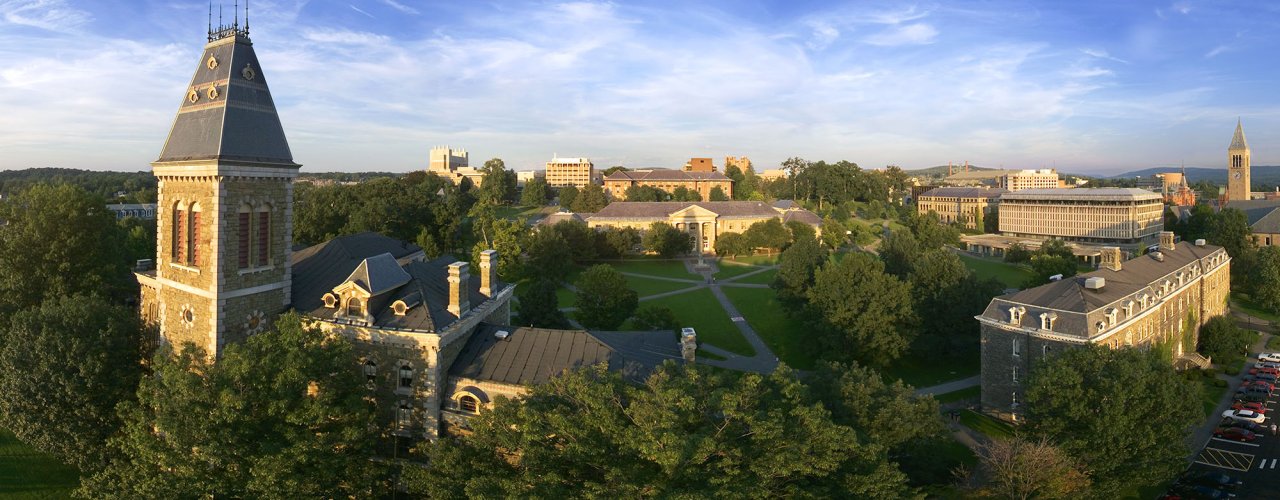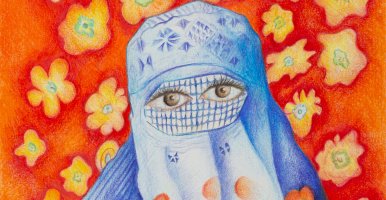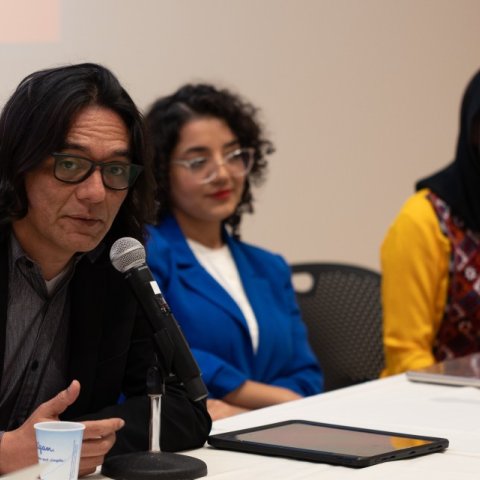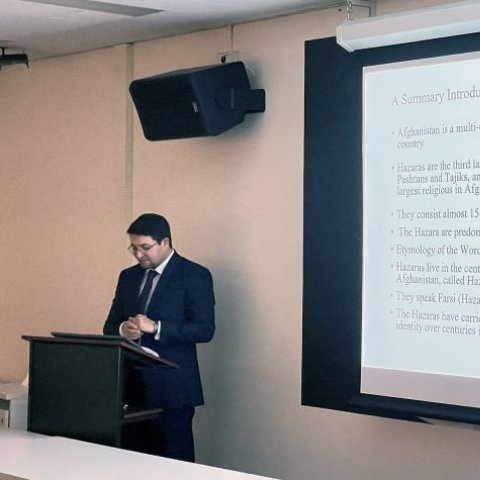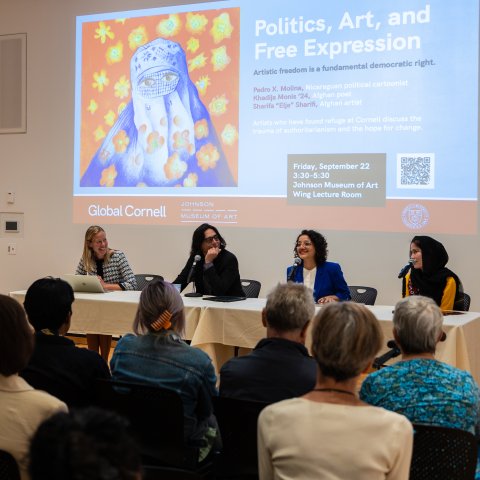Supporting Scholars Under Threat
Since 2016 Global Cornell has led campus and community support for international scholars, students, and human rights defenders whose work puts them at risk in their home countries.
Defying the Odds
To mark the freedom of expression theme year, Global Cornell presents a three-part series profiling the challenges and successes of Cornell’s scholars under threat alumni, written by Afghan journalist Fatima Faizi.
Elja Sharifi’s Voice for the Powerless
Afghan visual artist and scholar Sharifa “Elja” Sharifi fled Afghanistan in September 2021, a month after the Taliban seized control. She found a new beginning at Cornell's Herbert F. Johnson Museum of Art, where she has been able to continue her work over the past two years.
Pedro X. Molina’s Delicate Achievement
Cartoonist Pedro X. Molina, currently a visiting critic in the Einaudi Center, challenges Nicaragua’s dictatorship with a daily cartoon. In 2023, he was honored with the Václav Havel International Prize for Creative Dissent.
Azat Gündoğan’s Journey to FSU
After his family was forced to flee a government crackdown in Turkey, Florida State University sociologist Azat Gündoğan found a "lifeline" at Cornell as an IIE-SRC fellow.
Broad-Reaching Partnerships
Global Cornell works closely with the International Institute of Education’s Scholar Rescue Fund (IIE-SRF) to provide sanctuary for scholars at risk of persecution in their home countries. Cornell offers these scholars the opportunity to continue their research and teaching in a welcoming, safe, and supportive scholarly community as they pursue a more permanent situation for themselves and their families. We also work with IIE's Artist Protection Fund (IIE-APF) to offer refuge for threatened artists.
Thomas A. Russo, JD/MBA ’69, helped found IIE-SRF in 2002. Since then, the fund has worked to arrange temporary appointments for more than 700 scholars at over 370 institutions. Cornell first connected with IIE-SRF in 2004, when the College of Agriculture and Life Sciences supported a plant breeder fleeing political violence in Côte D’Ivoire.
Cornell's global and local partner organizations include:
- IIE-SRF and IIE-APF
- Open Society University Network’s Threatened Scholars Integration Initiative
- Ithaca City of Asylum, an all-volunteer project of the Center for Transformative Action
- Ithaca Welcomes Refugees
Opportunity Network for At-Risk Writers, Artists, Rights Defenders, and Scholars (ONWARDS) is a collaborative effort by civil society groups to support scholars under threat living in the U.S. by providing professional development resources and guidance. This project is locally coordinated by Ithaca City of Asylum and funded by Cornell's Scholars Under Threat initiative, part of Global Cornell.
Recent Workshops (video)
“By partnering with international scholar rescue organizations and local and campus partners, Global Cornell can provide visitors with a safe refuge and welcoming community, professional and educational opportunities, and resources to gain their footing and look ahead.”
~Wendy Wolford, Vice Provost of International Affairs
Scholars and Students in the News
"The resurgence of the Taliban poses renewed threats to the Hazaras, characterized by escalated violence, discrimination, and isolation," writes visiting scholar Tawab Danish.
Source
From a sociologist accused of treason to a political cartoonist to an Afghan artist, displaced scholars fleeing conflicts in their home countries have found refuge at Cornell, which has hosted more Institute of International Education scholar and artist fellows than any other university in the world.
Source
Eugene Nikiforovich, a fluid mechanics expert from Ukraine, researches geothermal energy and its properties—work he has been able to continue with support from Cornell since leaving Kyiv two years ago.
Afghan scholar Tawab Danish spoke at an event hosted by Einaudi's South Asia Program titled Hazaras and Shias: Violence, Discrimination, and Exclusion Under Taliban Rule. "We should use sanctions to force the Taliban to sit at the negotiation table. Otherwise, they have the power," said Danish.
Source
Azat Gündoğan is a former IIE-Scholar Rescue Fellow who was hosted in the Mario Einaudi Center for International Studies. The resources and connections he built at Cornell helped him to land a job. Now, he is an assistant teaching professor in the University Honors Program at Florida State University.
Campus Involvement
Cornell's work with scholars under threat has brought dozens of students and scholars to campus, including undergraduate and graduate students, academics, writers, journalists, and artists from seven countries. For scholars, a placement at Cornell provides an opportunity to engage in an intellectual and supportive community, collaborate on research, and teach students. For students, we offer access to higher education that is not available in the situations from which they are fleeing.
The Mario Einaudi Center for International Studies and its regional and thematic programs host the visitors during their time at Cornell, often in collaboration with academic departments. Einaudi provides a campus home with a welcoming intellectual community, collaborators and connections, and opportunities to build a sustainable career in the United States.
Scholars currently hosted at Cornell:
- The Einaudi Center's South Asia Program is hosting two Afghan scholars, one connected to the Department of Natural Resources and one to the Department of Government.
- The Einaudi Center's Latin American and Caribbean Studies program is hosting a Nicaraguan scholar.
- Global Cornell hosts two scholars, an Afghan artist within the Johnson Art Museum and a Ukrainian scholar remotely at Daugavpils University in Latvia.
- The Cornell Law School supports an Afghan law scholar.
- Cornell Brooks School of Public Policy hosts a Turkish scholar.
“One of the Einaudi Center’s core global research priorities is democratic threats and resilience. Integrating scholars into our community who are persecuted because of what they study—or who they are—is an act of democratic resilience that fosters intellectual pluralism at home and abroad.”
~Rachel Beatty Riedl, Director, Mario Einaudi Center for International Studies
How to Get Help
Cornell faculty seeking to host scholars under threat:
We regularly review the list of IIE-SRF fellows. A faculty review committee makes selections based on academic credentials and hosting opportunities at Cornell.
We are interested in learning about scholars under threat with links to Cornell faculty. We encourage those scholars to seek fellowships through IIE to obtain funding, evacuation, and visa support. If academic departments can host these IIE-SRF scholars, providing teaching and research opportunities, a living stipend, and assistance with integration into the community, the Office of the Vice Provost for International Affairs can provide supplemental funding and advice.
To learn more about the criteria used to determine placements at Cornell, please contact Nishi Dhupa.
International scholars under threat:
If you are a scholar who faces threats to your life or career in your home country, IIE-SRF can help you find a year-long fellowship at an institution of higher education. Cornell routinely hosts IIE-SRF scholars, and this is the first step in the path to coming to Cornell or other U.S. institutions.
Learn about IIE-SRF eligibility criteria.
If you have faculty connections at Cornell, please get in touch with them as well—faculty collaborators may be able to assist through their contacts or with an opportunity for a fellowship at Cornell.
“Lifting up one student will eventually lift up a family and a community. Cornell is doing what it can to help students find a pathway to a degree and a successful career. Similarly, scholars find a welcoming academic community and opportunities to teach and learn with breathing room to burnish a resume and seek longer-term employment and a secure future.”
~Nishi Dhupa, Associate Vice Provost of International Affairs
Support Us
The journey for displaced and threatened scholars and students may begin at home but continues at Cornell.
Most of our scholars under threat will never be able to return home. Scholars may require assistance with developing research collaborations and outputs, adapting to new teaching modalities, and looking ahead to secure careers in the U.S., along with assistance with housing, clothing, and schooling for their families.
Students often need tuition assistance as well as help with English language learning and academic writing, study skills, cultural support, housing, clothing, learning to drive, navigating banking and benefits systems, counseling and health services, and more.
Cornell's Scholars Under Threat initiative is primarily funded by the generosity of donors and the partnership of campus support services and academic departments. To support our efforts please give a gift today or contact Director of Development Christian Shaffmaster, by email or phone at +1-607-255-3461.

